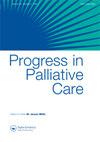Collecting data on end-of-life decision-making: Questionnaire translation, adaptation and validity assessment
IF 0.9
Q4 PUBLIC, ENVIRONMENTAL & OCCUPATIONAL HEALTH
引用次数: 3
Abstract
Little is known in Australia about current practice relating to medical end-of-life decisions preceding patient deaths. This study aimed to translate and culturally adapt a European questionnaire on medical end-of-life decisions and end-of-life care to the Australian context, producing a questionnaire to assess current medical practice in Australia and enable comparison with international studies. Following initial research team review, an English translation of the questionnaire was culturally adapted using four waves of cognitive pre-testing interviews with members of the target community: Australian doctors (n=27) from different specialties, clinical settings and geographical locations. Cognitive interviewing was used to identify potential problems with the translated questionnaire by examining the cognitive processes participants used to answer questions. Two experts in end-of-life research provided feedback on the questionnaire after the third wave of cognitive interviews. Research team review occurred again after the third and fourth waves of cognitive interviews. Interview notes were reviewed, coded and analysed using content analysis. A consensus approach was used to identify necessary adaptations, with all members of the research team endorsing the adaptations. Following cognitive pre-testing, an online version of the questionnaire was piloted with doctors, nurses and health law researchers (n=13). Improvements to questionnaire wording, flow/routeing and design were identified during the cognitive interviewing and piloting process and implemented. Saturation in terms of face and content validity and acceptability of the questionnaire was achieved after four rounds of cognitive interviews. Participants generally agreed that the adapted questionnaire instructions were easy to follow, the questions were easy to understand, they felt comfortable answering all the questions, and the online questionnaire format was user friendly. The time taken to complete the questionnaire (average 9.2 min) was also acceptable to participants. Cognitive interviewing was a suitable method for identifying and solving challenges with comprehension and applicability of the questionnaire within the Australian context. The final questionnaire was well accepted by doctors and is now being used in a study exploring the incidence and nature of medical end-of-life decisions involving adult patients in one Australian state (Victoria). This questionnaire may be suitable for use or further adaptation in research in other English speaking jurisdictions.临终决策的数据收集:问卷翻译、改编与效度评估
在澳大利亚,人们对患者死亡前的医疗临终决定的现行做法知之甚少。这项研究的目的是将欧洲关于医疗临终决定和临终关怀的调查问卷翻译并在文化上适应澳大利亚的情况,制作一份调查问卷,以评估澳大利亚目前的医疗实践,并与国际研究进行比较。在最初的研究小组审查之后,通过对目标社区成员的四波认知预测试访谈,对问卷的英语翻译进行了文化调整:来自不同专业、临床环境和地理位置的澳大利亚医生(n=27)。认知访谈是通过检查参与者回答问题的认知过程来识别翻译问卷的潜在问题。在第三波认知访谈之后,两位临终研究专家对问卷进行了反馈。在第三波和第四波认知访谈之后,再次进行了研究小组审查。使用内容分析对采访记录进行审查、编码和分析。采用一致的方法来确定必要的适应,研究小组的所有成员都赞同适应。在认知预测试之后,在医生、护士和卫生法研究人员(n=13)中试用了在线版问卷。在认知访谈和试点过程中确定并实施了对问卷措辞、流程/路线和设计的改进。经过四轮认知访谈,问卷的面孔和内容效度和可接受性达到饱和。参与者普遍认为,改编后的问卷说明易于遵循,问题易于理解,他们在回答所有问题时感到舒适,在线问卷格式对用户友好。完成问卷的时间(平均9.2分钟)也是可以接受的。认知访谈是一种适合识别和解决挑战的方法,在澳大利亚的背景下,对问卷的理解和适用性。最后的调查问卷得到了医生的广泛接受,目前正在澳大利亚一个州(维多利亚州)的一项研究中使用,该研究探讨了成年患者的医疗临终决定的发生率和性质。此问卷可能适合在其他英语国家的研究中使用或进一步调整。
本文章由计算机程序翻译,如有差异,请以英文原文为准。
求助全文
约1分钟内获得全文
求助全文
来源期刊

PROGRESS IN PALLIATIVE CARE
PUBLIC, ENVIRONMENTAL & OCCUPATIONAL HEALTH-
CiteScore
2.60
自引率
11.80%
发文量
24
期刊介绍:
Progress in Palliative Care is a peer reviewed, multidisciplinary journal with an international perspective. It provides a central point of reference for all members of the palliative care community: medical consultants, nurses, hospital support teams, home care teams, hospice directors and administrators, pain centre staff, social workers, chaplains, counsellors, information staff, paramedical staff and self-help groups. The emphasis of the journal is on the rapid exchange of information amongst those working in palliative care. Progress in Palliative Care embraces all aspects of the management of the problems of end-stage disease.
 求助内容:
求助内容: 应助结果提醒方式:
应助结果提醒方式:


